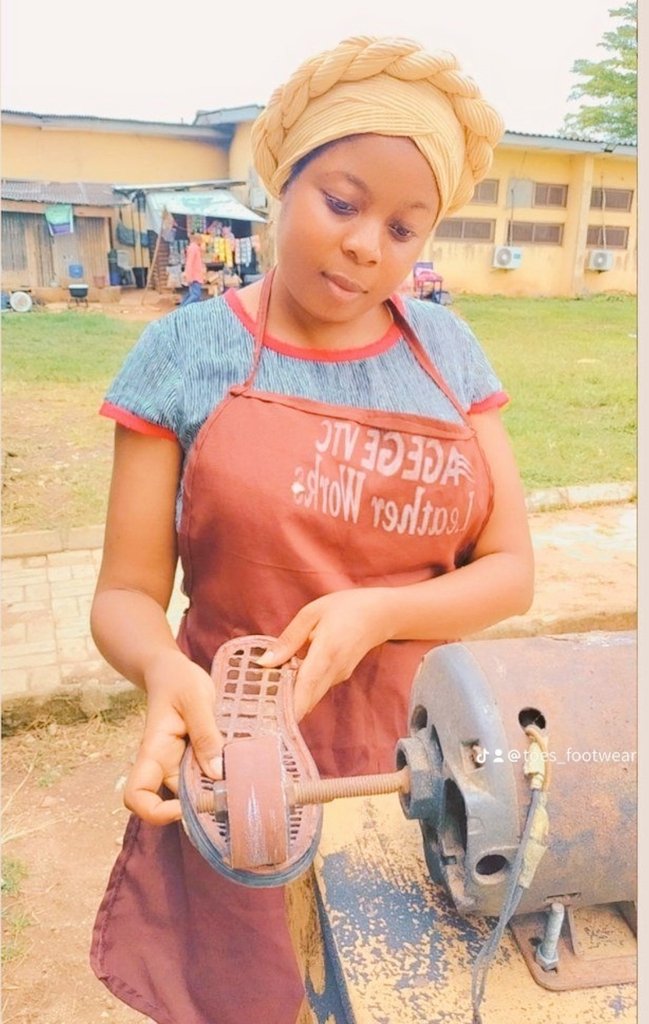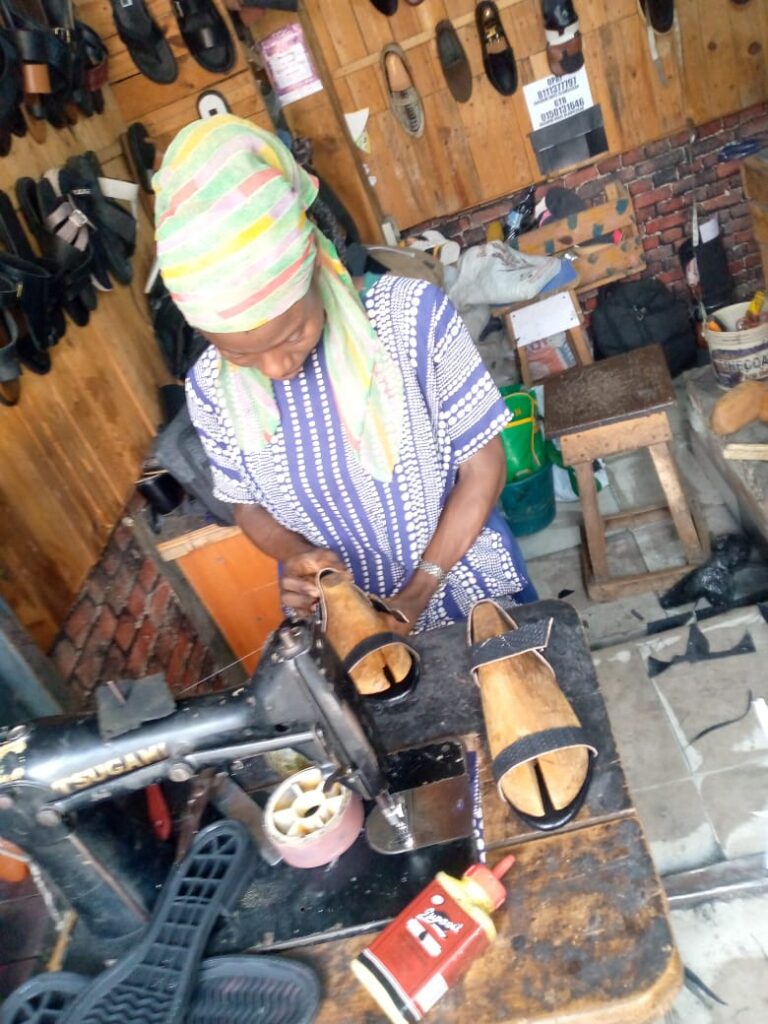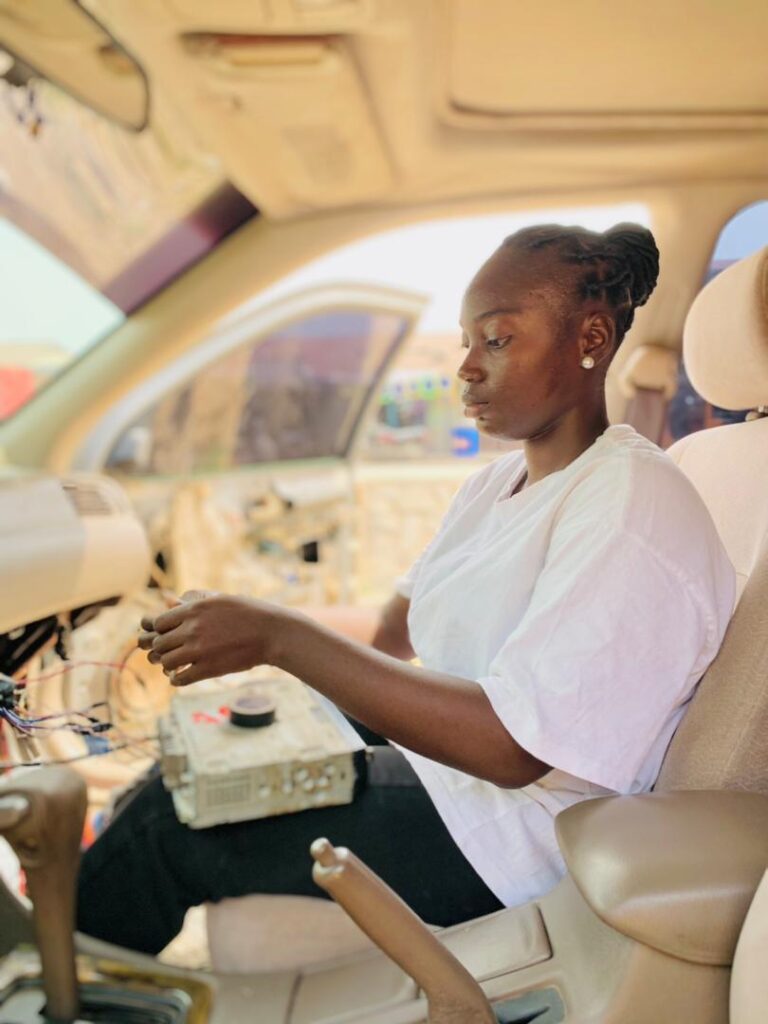As Nigeria, Africa’s largest democracy, grapples with its worst economic downturn in decades– women are taking up roles ordinarily reserved for men.
Oluwatoyin Falilat, is one such woman, a shoe designer in Nigeria’s commercial capital, Lagos, Ms. Falilat uses her craft to maintain her financial security, break gender norms, and empower young girls in the world of shoe designing.
A mechanical engineering graduate and an indigene of Abeokuta, Ogun State, Mrs. Falilat said shoe design was a path to independence for her. “I wanted a thing of my own,” she said, “I wanted to be an employer of labor.” She also knew her circle of friends were men, and they would patronize her.

“During my final year, I didn’t want to graduate and still depend on my parents. Studying mechanical engineering, I have lots of male friends and colleagues. I [then] realized men are keen about their footwear and would pay any amount to get a good one,” She affirmed.
But the journey has not always been easy. Mrs Falilat who now owns her brand called “Toes footwears” said “It was difficult when I started to get the acceptance I needed from people, they looked at me and said, you are too fine to be doing shoemaking, find something better. I keep on pushing because I love shoemaking.”
Even now, Mrs. Falilat still has the same drive she had when she started this journey in 2019- she wants to own her shoe factory and employ and train others to be like her. “That will be my own little way of giving back to society.”
Her journey in the shoe-making industry birthed a testament to consistency and resilience that women can flourish in every sector of human endeavor despite the unique challenges women face in their workplace. Using her knowledge of engineering, Mrs. Falilat said “now I am an employer of labour, I have other business I am doing now. I am glad I chose this path. [Though] I am not where I want to be yet, but I am not where I was before.”
From Classroom Practical To Career
Just like Mrs. Falilat, Ms. Oluwaseun Florence dared to venture outside the confines of her traditional course of study. A 29-year-old entrepreneur, Oluwaseun’s journey began during her National Diploma program in Special Education at the Lagos State Polytechnic.
“Back in my ND days, I chose leatherwork,” Ms. Florence said. “It was the first time our program offered a practical component, and there were admittedly a lot of flaws.”
Despite these initial challenges, Ms. Florence refused to be discouraged. During her semester break, she actively sought out additional training. “Initially, it wasn’t necessarily because I wanted to pursue leatherwork as a career,” she explained. “I mostly just wanted to be well-prepared for the next semester’s exams. But through a friend, I was introduced to a leatherworker who agreed to teach me.”

“Somewhere along the way, I fell in love with the craft,” Mrs. Florence continued. “What started as a one-month learning experience during the break turned into something much more. I told my teacher I was only interested in a month, but he honestly told me it wouldn’t be enough time. So, I took a leap of faith and decided to see where it went.”
Not yet Uhuru
A recent report by the United Nations’ Gender Social Norms Index or GSNI reveals a disheartening truth: there has been virtually no improvement in gender bias over the past decade. The report indicates that nearly 90% of men and women worldwide still hold unconscious biases against women. These biases manifest in various ways, with half the global population believing men are better political leaders and business executives than women. The report also found a shocking statistic: a quarter of the world’s population believes it is acceptable for a man to beat his wife.
The GSNI report further highlights the disconnect between women’s educational advancements and economic opportunities. Women are demonstrably more educated than ever before, yet even in countries where women hold the higher education edge, the gender pay gap remains a staggering 39% in favor of men.
Pedro Conceição, head of UNDP’s Human Development Report Office, emphasizes the broader societal impact of these biases: “Social norms that restrict women’s rights ultimately hinder overall development. The lack of progress on gender equality coincides with a global human development crisis. Everyone benefits from ensuring women have the freedom and agency to succeed.”
Hurdles after hurdles
Mrs. Falilat’s journey into shoemaking wasn’t easy. The first hurdle? Her own mother’s disapproval. “You studied mechanical engineering, men’s work!” her mother scoffed. “‘Shoemaking? Choose something other ladies do.'” But Mrs. Falilat persevered. Eventually, her skill silenced the doubters.
Ms. Florence faced similar prejudice. A neighbor dismissed her work, claiming she couldn’t make the shoes he needed. Ironically, he later became a loyal customer. She also encountered assumptions about her education. “One man was surprised I was educated,” she recalled, highlighting the misconception that skilled trades are for those without formal schooling.
Ms. Florence remains undeterred, motivated by both discrimination and acceptance. “Someone even complimented me with money for being a female shoemaker,” she added.
Although a different profession, Ms. Rukayat Afuwape, a biochemistry student, walked the same path- swimming in waters dominated by men. A barber, Ms Afuwape faced resistance from her her sisters, all in traditionally feminine professions. She wanted to break the mold.
Initially, customers, both male and female, questioned her abilities. Some men feared she’d “spoil” their hair, clinging to the belief that “girls don’t touch heads.” This prejudice ultimately led her to work independently, where she could choose her clients.
Also, Aremu Oluwaseun, a radio technician, learned the trade from her father. However, when customers sought her father’s expertise in his absence, they often went elsewhere. This initial discouragement fueled her determination. “Most men think I shouldn’t be doing this work as a female,” she stated. Despite the bias, Ms. Oluwaseun finds joy in her work and aims to change the perception of female technicians.

Women as Economic Powerhouse- Gender Justice Advocate
Taoheed Adegbite, a gender justice advocate, highlights the women thriving in these “male-dominated” fields as inspiration for others. He emphasizes the gap between societal limitations placed on women and their actual capabilities. Adegbite believes anyone with determination can succeed regardless of gender.
“Women entering these traditionally male fields are doing the right thing, for our economy,” he states. Adegbite emphasizes that skill and individual drive, not gender, determine success. He acknowledges the lingering patriarchal beliefs that restrict women to limited professions.
“These barrier-breakers face stigma, seen as rebels,” he continues. However, Adegbite points to studies suggesting a larger female workforce could revitalize the economy. “They’re not just challenging stereotypes, but contributing to the nation’s well-being,” he concludes.
Nigeria, Africa’s largest democracy, faces economic challenges, prompting women to take up traditionally male-dominated roles. Oluwatoyin Falilat is a shoe designer in Lagos leveraging her mechanical engineering degree to empower young girls and break gender norms. Despite initial resistance and gender bias, her brand “Toes Footwears” thrives.
Similarly, Oluwaseun Florence ventured into shoemaking from a Special Education background, overcoming skepticism and gender biases to embrace the craft. Both women’s stories highlight persistence and the desire to defy societal expectations.
The UN’s Gender Social Norms Index report shows persistent global gender biases, with significant pay gaps and belief disparities in women’s leadership capabilities. Women like Falilat and Florence pave the way, showing that skills and determination can overcome societal limitations.
Other women, such as Rukayat Afuwape in barbering and Aremu Oluwaseun in radio technology, share similar journeys, facing and overcoming gender prejudice in their fields.
Gender justice advocate Taoheed Adegbite underlines the importance of women in male-dominated fields for economic growth, emphasizing that skill and determination, not gender, determine success. Overcoming stigma and contributing to the national economy, these women challenge stereotypes and inspire broader societal change.






